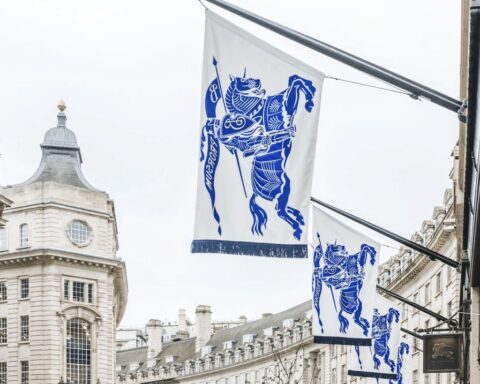The Chinese market heavily impacted Burberry and Richemont’s results in the last quarter of 2022. But Europe helped them maintain decent growth.
Burberry disappointed analysts, announcing on Wednesday a growth of only 1% in the last three months of 2022. The early consensus was for double that. As a reminder, the growth of the British House had reached + 11% the previous quarter.
Burberry’s Achilles heel: like-for-like sales in China, plunged by persistent restrictions related to Covid, plunged by 23%. This was enough to cause its Asian market to fall by 7%. Fortunately, however, Europe helped to offset these poor results. The turnover of the “old continent, Middle East, India and Africa” as a whole has indeed increased by 19%.
“Europe, in particular, has continued to perform well, driven by strong trade during the holiday season, and leather goods recorded a new quarter of double-digit growth worldwide,” said the CEO of the company. said Burberry’s CEO Jonathan Akeroyd.
Note that the Americas were also in poor shape for Burberry, with a decline of 1%.
Richemont also lead by China
For its part, Richemont, including owner of the brands Cartier, Van Cleef & Arpels, Azzedine Alaïa or Cholé, has also suffered greatly on the Chinese market in the last
quarter of 2022.
“The massive increase in Covid cases had a negative impact on customer traffic and, due to the unavailability of staff, led to a reduction in store hours or temporary closures of outlets in mainland China, resulting in a 24% decline in sales during the period under review,” the Swiss group said.
But thanks to strong local demand and the return of tourists (especially Americans and Middle Easterners) to Europe and Japan, Richemont escaped the Berezina. It posted an 8% increase in its consolidated quarterly sales to 5.4 billion euros. A performance, however, below the consensus of analysts, which was 5.67 billion euros.
In Europe, the Swiss group’s sales grew by 19% at constant exchange rates, while they plunged by 7% in Asia-Pacific. However, while China, Hong Kong and Macao fell back in the region, Japan performed very well, with a 43% increase in sales at constant exchange rates!
As in Europe, the combination of “good domestic sales and returning tourists” played a role.
For its part, despite this disappointing end to the year, Burberry said it was “satisfied with its overall performance” in 2022 and indicated that it “remains confident that it will be able to achieve its medium-term objectives despite a more difficult macroeconomic environment”.
The easing of anti-covid constraints in China at the end of 2022 should make its task easier, as well as those of Richemont and the other luxury companies.
Read also >The man will walk in Milan and Paris











